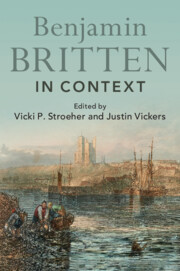Book contents
- Benjamin Britten in Context
- Composers in Context
- Benjamin Britten in Context
- Copyright page
- Dedication
- Contents
- Figures
- Tables
- Notes on Contributors
- Acknowledgements
- Bibliographic and In-Text Abbreviations
- Prologue
- Part I The Britten Circle(s)
- Part II British Musical Life
- Chapter 7 Composing in England
- Chapter 8 Britten and Film
- Chapter 9 Britten and the Radio
- Chapter 10 Recording a Musical Experience: Britten’s Works on Record and Television
- Chapter 11 Music Critics and the Press
- Chapter 12 Britten and English Opera
- Chapter 13 Festival Culture in the British Isles
- Chapter 14 Concert Life in Britain
- Chapter 15 Benjamin Britten and Folk Song
- Chapter 16 Educating the Nation
- Part III Britten and Other Composers
- Part IV Wordsmiths, Designers, and Performers
- Part V British Sociocultural, Religious, and Political Life
- Further Reading
- Index
Chapter 7 - Composing in England
from Part II - British Musical Life
Published online by Cambridge University Press: 31 March 2022
- Benjamin Britten in Context
- Composers in Context
- Benjamin Britten in Context
- Copyright page
- Dedication
- Contents
- Figures
- Tables
- Notes on Contributors
- Acknowledgements
- Bibliographic and In-Text Abbreviations
- Prologue
- Part I The Britten Circle(s)
- Part II British Musical Life
- Chapter 7 Composing in England
- Chapter 8 Britten and Film
- Chapter 9 Britten and the Radio
- Chapter 10 Recording a Musical Experience: Britten’s Works on Record and Television
- Chapter 11 Music Critics and the Press
- Chapter 12 Britten and English Opera
- Chapter 13 Festival Culture in the British Isles
- Chapter 14 Concert Life in Britain
- Chapter 15 Benjamin Britten and Folk Song
- Chapter 16 Educating the Nation
- Part III Britten and Other Composers
- Part IV Wordsmiths, Designers, and Performers
- Part V British Sociocultural, Religious, and Political Life
- Further Reading
- Index
Summary
For most British composers active in the twentieth century, the actual writing of music was only one of many skills they were obliged to develop. Many composers were also actively engaged in the fields of teaching, performance, and administration, and could supplement their income with a variety of other jobs, ranging from adjudication and private tutoring to broadcasting and music criticism. Additionally, the growth in popularity of radio, television, and film opened up new opportunities for composers in lighter genres that had hitherto not been available, either to supplement their contributions to more traditional concert hall repertory, or as dedicated positions in their own right. This chapter will examine these various career paths and responsibilities, looking at how British composers’ training, abilities, interests, and sociocultural status shaped and directed their vocational trajectories.
Keywords
- Type
- Chapter
- Information
- Benjamin Britten in Context , pp. 63 - 70Publisher: Cambridge University PressPrint publication year: 2022

